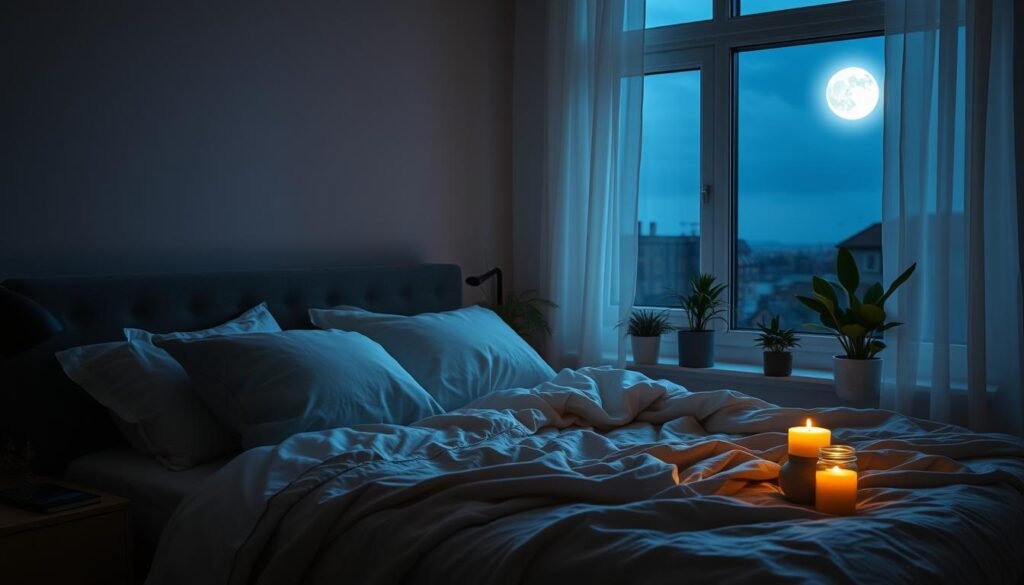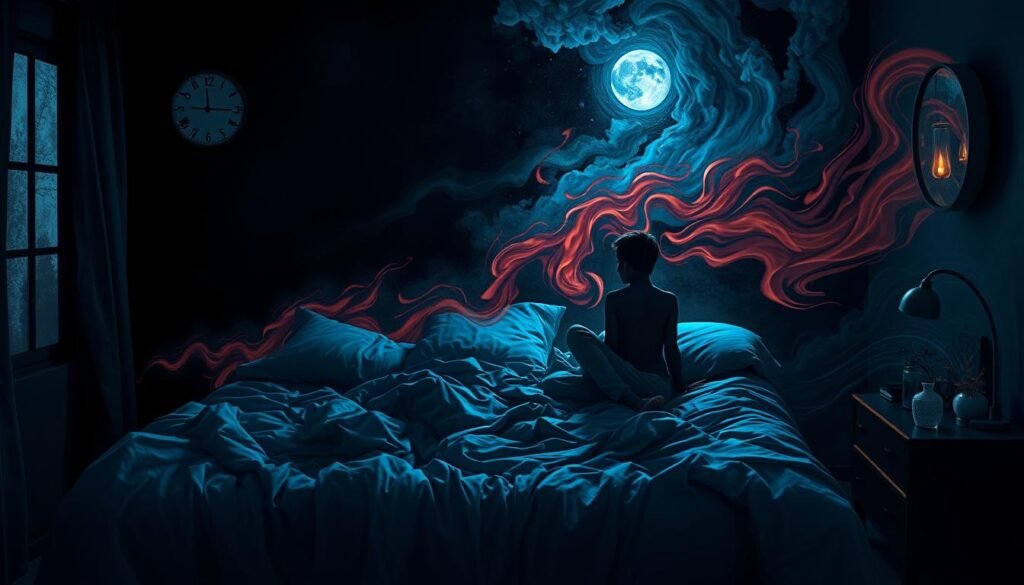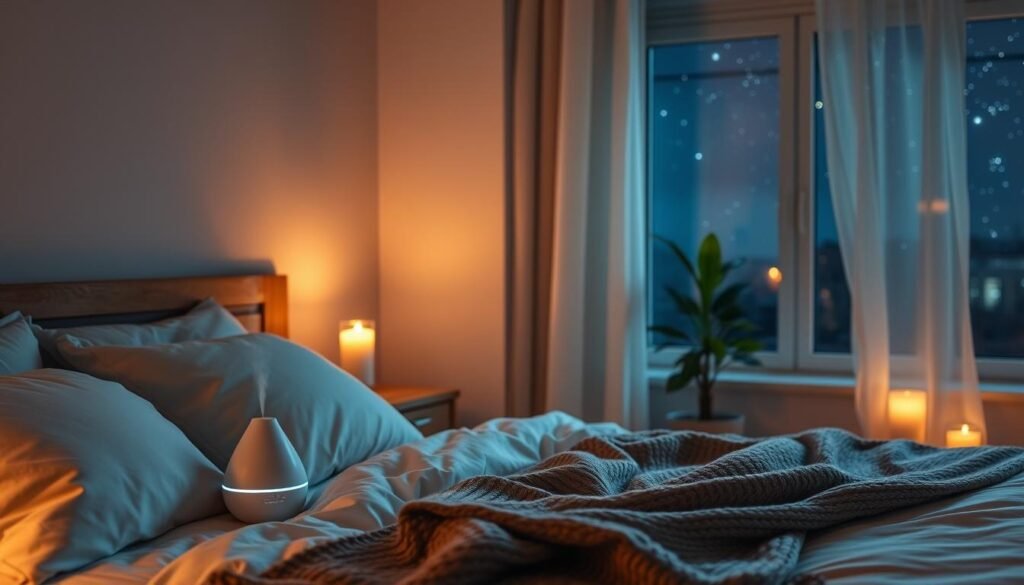Did you know that roughly 40 million adults in the U.S. are affected by anxiety disorders? This makes it the most common mental health issue. Many people feel fine during the day but struggle with anxiety at night. The quiet of the night lets worrisome thoughts come more easily. But, there are ways to deal with this problem and sleep better.
Improving your nighttime routine can make a big difference in your sleep. This article talks about various methods. These include calming routines, natural remedies, and mindfulness. These strategies can help you manage your nighttime anxiety. You can read more about how to calm your anxiety at. With the right approach, you can enjoy nights that are peaceful and full of restful sleep.
Key Takeaways
- Anxiety disorders impact around 20% of U.S. adults.
- Creating a calming nighttime routine can improve sleep quality.
- Natural remedies, like herbal teas, can help alleviate night anxiety.
- Mindfulness techniques, such as deep breathing, promote relaxation.
- Taking a break from technology before bed supports better sleep.
- Journaling can clarify thoughts and reduce emotional distress.
Understanding Nighttime Anxiety
Nighttime anxiety is a big problem for many people. It shows up as worry and fear that gets worse at night. A lack of sleep can make this anxiety stronger, making the next day harder.
The quiet of the night can make our worries seem bigger. This is because there’s nothing to distract us from them.
To deal with this, it’s important to understand what causes these feelings. Things like natural disasters or big changes in life can make night anxiety worse. Having a tough childhood can also make adults worry more at night. Managing this anxiety is key for good sleep.
Many things can cause nighttime anxiety. Your genes might be one reason. Also, some medicines, like steroids and antihistamines, can make you feel anxious. This can make it hard to sleep, creating a cycle of anxiety and poor sleep.
Knowing the signs of nighttime anxiety is important. They include:
- Worrying thoughts
- Restlessness
- Headaches
- Muscle tension
- Increased heart rate
- Sweating
- Shortness of breath
If you notice these symptoms, try using calming techniques. Being more aware of your feelings can help. Techniques like breathing exercises, muscle relaxation, or therapy can be very helpful.
Common Causes of Anxiety at Night
Many people struggle with anxiety at night due to different reasons. Stress from work or problems in relationships can make it hard to relax at bedtime. These issues can lead to too much worrying when trying to fall asleep.
Nocturnal panic attacks can also disturb sleep greatly. They come suddenly, often without a clear reason, causing fear and a fast heartbeat. Even though they might last a short time, their impact can last much longer for those already dealing with daytime anxiety. Factors like genetics, stress, and changes in brain function play a role.
Not sleeping enough can make anxiety worse. A rise in noradrenaline at night can cause distress, making it tough to sleep. Anxiety and insomnia feed into each other, creating a vicious cycle that’s hard to break. Those waking up anxious often can’t easily fall back asleep, as worry and fear take over.
Dealing with these issues is crucial for better sleep. Treatments like cognitive behavioral therapy or medication can improve sleep quality. Having a calming bedtime routine, such as writing in a journal or listening to gentle music, helps in easing into sleep.
How to Get Rid of Bad Anxiety at Night
Firstly, recognizing what makes your anxiety spike at night is key. It’s helpful to find out what causes your nighttime worries. Keeping a journal can help. It turns reflecting at night into a strong way to understand your anxiety. Practicing mindfulness boosts self-awareness. It helps spot stressors that pop up as the night falls.
Identifying Triggers for Nighttime Anxiety
Every day, certain events or feelings may make anxiety worse at night. Reflecting deeply helps dissect these stressors. Issues like ongoing stress, emotional problems, and losses might come back to haunt at night. Paying attention to feelings and thoughts can show how daily troubles link to night anxiety.
Exploring the Connection Between Daytime Stress and Nighttime Anxiety
The stress you feel during the day affects your anxiety at night. Studies show that problems not dealt with in the daytime can increase anxiety when you try to sleep. For example, big life changes or ongoing health issues can keep anxiety going at night. Getting professional help is key if sleep and mental health worsen due to day stress. Techniques like muscle relaxation can greatly improve mental health at night.

| Factors Contributing to Nighttime Anxiety | Suggestions for Management |
|---|---|
| Chronic Stress | Practice mindfulness and journaling to uncover sources |
| Lack of Assertiveness | Engage in assertiveness training or counseling |
| Major Life Changes | Seek support from friends and family during transitions |
| Substance Triggers | Avoid stimulants like caffeine before bed |
| Unresolved Personal Loss | Consider talking to a mental health professional |
Knowing how to fight off bad anxiety at night improves peace in those hours. Building on techniques to handle daytime stress and using specific methods helps create a calm atmosphere. By reflecting regularly and taking action, managing nighttime anxiety becomes doable.
Symptoms of Nighttime Anxiety
Nighttime anxiety can be tough, making it hard for people to get good sleep. It comes with both physical and mental symptoms. These make it hard to relax at night.
Physical Signs of Anxiety
Physical signs of anxiety are like alarms. They tell us that something’s not right. You might feel:
- Increased heart rate: Your heart beats fast, making calmness hard to find.
- Tension in the muscles: Your neck, shoulders, or back may feel tight. This makes it hard to get comfortable.
- Sweating: Sweating at night can mess with your sleep.
- Restlessness: You might keep moving around in bed, unable to settle.
Mental Symptoms and Their Impact on Sleep
Mental symptoms can mess with your sleep just as much. You might experience:
- Persisting worry: Constant worry about the future can keep your mind busy at night.
- Fear and dread: Being scared of the night or sleeping can make anxiety and sleeplessness worse.
- Paranoia: For some, paranoia shows up, especially if they use stuff like marijuana to try and relax.
It’s important to understand these nighttime anxiety symptoms. They don’t just ruin sleep; they can lead to serious health problems. These include high blood pressure, depression, and trouble thinking. Knowing these signs helps people find ways to cope better.

Establishing a Calming Nighttime Routine
Creating a calming nighttime routine helps ease nighttime anxiety. It’s important to add structure to your evening. This preps your body and mind for a good night’s sleep.
Engage in relaxing activities before bed. These activities create a sense of calm. They also tell your body it’s time to slow down.
Creating a Pre-Sleep Environment
Turning your bedroom into a peaceful place improves sleep. Make simple changes like reducing noise and dimming lights. Ensure the room temperature is comfortable.
Add calming scents like lavender through aromatherapy. This helps make your nighttime routine calming. It gets your mind ready for sleep.
Suggested Relaxing Activities Before Bed
Adding certain activities to your night routine can help you relax and sleep better. Here are some great options:
- Reading a calming book under soft lighting to soothe the mind.
- Practicing gentle yoga or stretching exercises to release physical tension.
- Engaging in deep breathing exercises or progressive muscle relaxation to alleviate stress.
- Keeping a journal or making a to-do list to sort thoughts and tasks before sleep.
- Taking a warm bath, which can trigger a sleepy response due to the subsequent drop in body temperature.
It’s key to do these relaxing activities before bed. They let your brain know it’s time to rest. Being consistent with these habits is good for sleep. It boosts your overall well-being too.

| Activity | Benefits |
|---|---|
| Reading | Calms the mind and reduces racing thoughts. |
| Gentle Yoga | Releases physical tension and promotes relaxation. |
| Deep Breathing | Reduces anxiety and enhances relaxation response. |
| Journaling | Helps organize thoughts and alleviate nighttime worries. |
| Taking a Bath | Induces a natural sleepy response and relaxes the body. |
Natural Remedies for Nocturnal Anxiety
Many people looking for ways to beat nighttime anxiety turn to natural remedies. They learn that what they eat and drink matters. Using herbal teas and certain foods can improve sleep and lower anxiety. This helps them feel more at peace at night.
Benefits of Herbal Teas and Natural Supplements
Chamomile tea is great for better sleep and easing anxiety. Studies have found that taking chamomile as a supplement can help. It reduces the symptoms of anxiety. Chamomile’s soothing effect is a big help for those struggling with nighttime worries.
Lavender is another remedy that helps with stress. It is especially good before stressful events. Aromatherapy using essential oils can decrease anxiety too. Besides lavender, lemon balm and L-theanine are known to calm anxiety and improve sleep.
Trying different natural options can be a game-changer for people with anxiety. By learning about natural remedies for nocturnal anxiety, they can take control of their night routine. This empowers them.
Exploring Nutrition and Sleep-Related Foods
The link between what we eat and our anxiety level is strong. Foods that help us sleep, like tart cherries, can make a big difference. These foods are full of melatonin. Including omega-3s, vitamin B6, and B12 in our diet can also help with anxiety. Magnesium has shown promise in reducing mild anxiety, which can improve sleep quality.
Eating healthy is key to fighting off anxiety. It also helps us unwind before bed. A light snack at night can keep blood sugar levels stable, reducing anxiety. Combining a good diet with natural remedies can lead to better sleep and less anxiety at night.
Mindfulness Techniques for Managing Bedtime Anxiety
Mindfulness plays a key role in easing bedtime worries. Adding these steps to your nighttime routine helps you relax. It makes for a calm, peaceful sleep. Deep breathing and guided imagery are great. They lower anxiety and make bedtime calm.
Deep Breathing Exercises
Deep breathing is perfect for calming your mind and letting go of stress. The 4-7-8 technique is one to try. You breathe in for four seconds, hold it for seven, then breathe out for eight. It slows your heart and calms you. Doing this often can lead to better sleep, especially if you find it hard to fall asleep.
Guided Imagery or Visualization Practices
With guided imagery, you picture peaceful places. Thinking of a quiet beach or forest can push away worry. There are lots of free meditations online, easy for everyone to try. Using this as part of your bedtime ritual can really help you relax. It makes your sleep better and lowers your stress at night.
| Mindfulness Technique | Description | Benefits |
|---|---|---|
| Deep Breathing Exercises | Inhale for 4 seconds, hold for 7, exhale for 8 | Reduces heart rate, calms the nervous system |
| Guided Imagery | Visualizing peaceful environments | Shifts focus from anxiety, promotes tranquility |
| Mindful Tea Preparation | Making tea with focus and attention | Enhances presence, reduces stress |
| Journaling | Writing thoughts and feelings to clarify the mind | Tames swirling thoughts, provides relief |
Tips for Anxiety-Free Nights
To make nights free of anxiety, start with simple steps that encourage calm and clear thinking. One good way is to use technology less. Cutting down screen time before bed helps avoid sleep problems caused by blue light. Having a tech-free time before sleep not only keeps you away from stress from social media but also helps keep your cortisol levels in check. This could otherwise make you restless at night.
Setting Healthy Boundaries on Technology Use
Making a bedtime routine helps a lot for your well-being. Choose calming activities like reading or light stretching for easing into sleep. These activities trigger your body to relax, setting the stage for a restful night. They stop day-time worries from keeping you up at night. To find out how stress relief before bed can improve your sleep, learn more here.
Using Journaling as a Tool for Clarity
Journaling is also great for peaceful nights. Writing down thoughts and worries during the day can clear your mind for better sleep. Studies suggest journaling for an hour daily could reduce nighttime anxiety. It works well with natural supplements for emotional balance, offering a full plan to manage stress. For details on supplements that help with these strategies, see here.